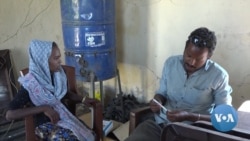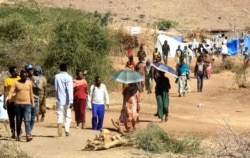The conflict in Ethiopia's Tigray region has pushed tens of thousands of people into refugee camps in Sudan, where aid groups are struggling to provide care. A Tigrayan doctor who fled the fighting has set up a clinic in the Hashaba refugee camp in Al Gadarif, Sudan.
Internal medicine specialist Darlyelo Geosh was a well-known doctor in Himora city in Ethiopia before he fled to Sudan this month.
Geosh, and other colleagues displaced from Ethiopia, have now established a small clinic in the Hashaba refugee camp, east of Sudan’s Al Gadarif city, to help those in need of medical attention.
The clinic has no tools to diagnose, or shelves on which to stock medicine, yet refugee doctors are eager to help despite challenging circumstances.
He says when they arrived here, they realized the need to make a clinic to help their people. The Al Gadarif state bureau gave them some medicine to start working, but what they have is essential medication for primary health care. Goesh adds that people with acute diseases like tuberculosis, diabetes, heart failure and HIV have no medications. There is also no laboratory for diagnosis.
The Hashaba camp has nearly 16,000 refugees. Women and children represent 70% of the arrivals, according to the camp administration.
A 4-meters-size room is given to every family, and certain rooms are dedicated to those with chronic diseases.
This clinic member notes that many fled Ethiopia without the medicines they require.
Gebretsadik said a lot of people left Humera, Mai-Kadra, Barakat and western Tigray. There are many people with HIV, tuberculosis, diabetes and high blood pressure. They left their drugs because of the war and are without any of their medications.”
Many international and Sudanese organizations are working to help the refugees’ fragile health situation and are calling for a larger intervention.
Hashim says due to their work in refugee health care, they noticed a variety of fatal and acute diseases. They are sending a message to international civil society organizations to provide aid and tools so they can protect people and control the possible spread of the diseases.
Hashaba camp director Mustafa Anwar is also putting out a call for help.
Mustafa says the heavy influx into the camp in the Hashaba region has reached 15,557 amid tough economic conditions in Sudan. He calls on international health organizations to quickly intervene, as people are in a state of emergency.
Sudanese authorities have reported fewer new arrivals in recent days, due to the closure of some borders on the Ethiopian side and the escalating turmoil in the Tigray region.






